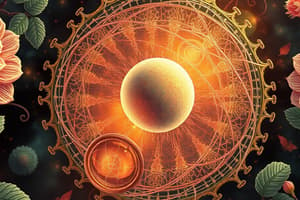Podcast
Questions and Answers
What significant theory did cell theory replace?
What significant theory did cell theory replace?
- Theory of spontaneous generation (correct)
- Atomic theory
- Theory of evolution
- Cellular respiration theory
Who were the primary figures credited with formulating cell theory?
Who were the primary figures credited with formulating cell theory?
- Albert Einstein and Marie Curie
- Matthias Schleiden, Theodor Schwann, and Rudolph Virchow (correct)
- Gregor Mendel and James Watson
- Charles Darwin and Louis Pasteur
Which statement best defines a key tenet of cell theory?
Which statement best defines a key tenet of cell theory?
- All living organisms are composed of organ systems.
- Complex organisms do not contain any single-celled organisms.
- Cells arise spontaneously from non-living matter.
- All living organisms are made up of cells. (correct)
What is the function of the cell membrane?
What is the function of the cell membrane?
During which process do cells create identical copies of themselves?
During which process do cells create identical copies of themselves?
Why are viruses often not classified as living organisms?
Why are viruses often not classified as living organisms?
What role do organelles play within a cell?
What role do organelles play within a cell?
What does it mean that all cells arise from pre-existing cells?
What does it mean that all cells arise from pre-existing cells?
Flashcards
Cell Theory
Cell Theory
The theory stating that all living organisms are made up of cells, cells are the basic unit of life, and all cells come from pre-existing cells. It replaced the outdated theory of spontaneous generation.
Mitosis (Cell Division)
Mitosis (Cell Division)
The process of cell division in both single and multicellular organisms, where a cell divides to create two identical daughter cells.
Cell Membrane
Cell Membrane
A semi-permeable membrane surrounding the cell, made of phospholipids. It controls the movement of substances in and out of the cell.
Cytosol
Cytosol
Signup and view all the flashcards
Organelles
Organelles
Signup and view all the flashcards
DNA
DNA
Signup and view all the flashcards
Spontaneous Generation
Spontaneous Generation
Signup and view all the flashcards
Viruses
Viruses
Signup and view all the flashcards
Study Notes
Cell Theory
- Cell theory is the accepted view of how life on Earth functions, replacing the obsolete theory of spontaneous generation
- The theory of spontaneous generation claimed that living organisms could arise from non-living matter, for instance, maggots from rotting meat and mice from wheat
- Cell theory was formulated in 1839, largely attributed to Matthias Schleiden, Theodor Schwann, and Rudolph Virchow, through extensive studies and advancements in microscopes
Tenants of Cell Theory
- All living organisms are made up of cells.
- Cells are the basic building blocks of life, even single-celled organisms like amoeba perform all life processes within a single cell.
- Complex organisms like plants, animals, and humans are comprised of millions of cells.
- Cells are the basic structural and functional unit of all living organisms.
- Cells contain all the necessary components for life processes, such as obtaining energy, reproduction, movement, and excretion.
- Cells form tissues, tissues form organs, organs coalesce to form organ systems, and organ systems combine to form an organism.
- All cells arise from pre-existing cells.
- Cells do not appear spontaneously; they originate from the division of existing cells.
- Hereditary information is passed from parent cells to daughter cells during cell division.
- The first primitive cells arose on Earth billions of years ago, and all cells have evolved from them.
Key Features of Cells
- Cell Membrane: A semi-permeable membrane made of phospholipids, encapsulates the cell and regulates what enters and exits.
- Cytosol: A fluid within the cell membrane, containing water, salts, and other solutes.
- Organelles: Specialized structures within the cytosol dedicated to carrying out various cellular functions.
- DNA: Genetic material found in every cell, containing the instructions for life processes.
Viruses
- Some scientists do not consider viruses as living organisms as they lack the cellular structure and don't function independently.
Cell Division (Mitosis)
- Cells divide through a process called mitosis, creating identical copies of themselves.
- This process allows for growth, repair, and development of multicellular organisms.
- Mitosis is the process of cell division in both single and multicellular organisms.
Complexity of Life
- The complexity of an organism is built upon the organization of cells.
- Although an organism can be very complex, the fundamental processes of life (like obtaining energy) occur at the cellular level.
Studying That Suits You
Use AI to generate personalized quizzes and flashcards to suit your learning preferences.




